10 Things in Your Home Crawling With More Germs Than a Toilet Seat

You wouldn’t rub your bare hands all over your toilet seat and then continue about your day, right? Well, in practice, you may be doing just that since there are a ton of things in your home that are actually dirtier than a toilet seat—and that you’re probably rarely cleaning.
Past research has found that toilet seats only contain about 50 bacteria per square inch. Granted, that might seem like a lot, but just wait until you find out how many are lurking on other common household items. Read on to hear from experts about TK things you’re touching every day that are crawling with germs. Plus, some tips on how to sanitize these filthy items.
RELATED: 16 Gross Household Items You Should Replace More Often.
1
Dish sponge
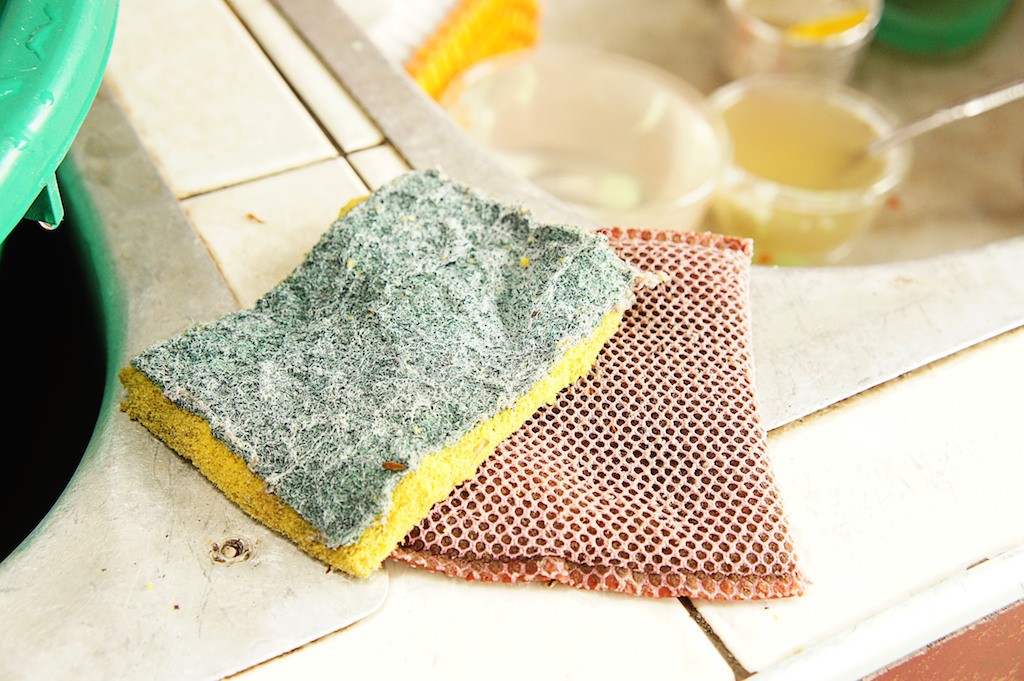
If you don’t already disinfect or replace your kitchen sponge regularly, get ready to change your ways. Because of all the food, dirt, and grime they soak up on the daily, sponges contain way more germs than a toilet seat, as proven by a study published in Scientific Reports that detailed the exact “bacterial microbiome” of used kitchen sponges.
Study lead Markus Egert, a microbiologist at Furtwangen University in Germany, told NPR, “We found 362 different species of bacteria, and locally, the density of bacteria reached up to 45 billion per square centimeter.”
“That’s a very huge number of bacteria, indeed,” he continued. “There’s hardly any habitat on Earth where you’ll find similar densities of bacteria, except for the human intestinal tract.”
A separate study, published in the Journal of Applied Microbiology, found similar results regarding dish sponges, but suggests that brushes are a better alternative.
Study author Trond Mretr, a research scientist at Nofima, a Norwegian food research institute, told ABC News, “Salmonella and other bacteria grow and survive better in sponges than in brushes, the reason is that sponges in daily use never dry up.”
“The sponge is humid and accumulates food residues which are also food for bacteria, leading to rapid growth of bacteria,” he continued, adding that even if you keep your sponge “clean,” it will still harbor tons of germs.
A brush, on the other hand, “dries very fast,” he explained, so “harmful bacteria will die. He added, “Also, most brushes have a handle which prevents you from direct hand contact with potential harmful bacteria, in contrast to sponges.”
2
Cell phone

Considering you touch your phone all day and probably bring it into the bathroom, is it any surprise that it’s crawling with germs?
“Taking a cell phone into the bathroom and then leaving with it is kind of like going in, not washing your hands and then coming back out. It’s the same level of concern,” Emily Martin, PhD, assistant professor of epidemiology at the University of Michigan School of Public Health, told TIME.
In fact, research has found that cell phones contain 10 times more bacteria than a toilet seat. As Time reports, “Studies have found serious pathogens on cell phones, including Streptococcus, MRSA and even E. coli.”
So, how do you go about disinfecting your phone without getting it wet?
Susan Whittier, director of clinical microbiology at New York-Presbyterian and Columbia University Medical Center, told Time that her best advice is to mix together 60 percent water and 40 percent rubbing alcohol, and then dip a cloth in it before gently wiping your phone. Unless you’re sick, she recommends doing this a few times per month.
RELATED: 13 Worst Items to Store in Your Pantry.
3
Kitchen sink
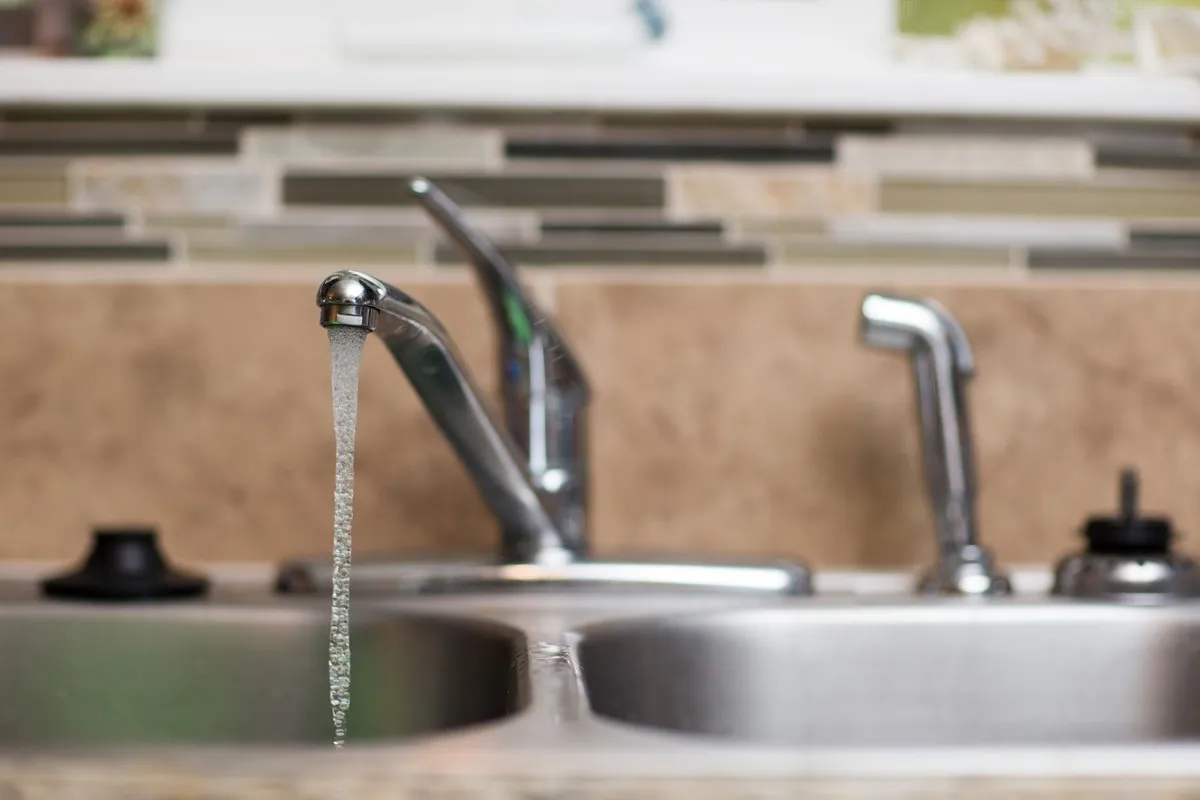
“There’s more E. coli in a kitchen sink than in a toilet after you flush it,” microbiologist Charles Gerba, a professor of public health, environmental science and immunology at the University of Arizona, told Food & Wine. “The sink is a great place for E. coli to live and grow since it’s wet and moist. Bacteria feed on the food that people put down the drain and what’s left on dishes in the sink.”
In fact, a 2011 study conducted by the National Sanitation Foundation (NSF) found that 45 percent of household kitchen sinks tested positive for coliform bacteria, “a family of bacteria that includes Salmonella and E. coli and is an indicator of potential fecal contamination.”
To put that in perspective, only 27 percent of bathroom toothbrush holders and 9 percent of bathroom faucet handles tested positive for coliform bacteria.
After using your sink during food prep, the U.S. Department of Agriculture (USDA) recommends the following two-step cleaning process:
- Clean: use warm, soapy water to wash the sink. Wipe it clean with single-use or paper towels.
- Sanitize: use a sanitizer and let air dry. Sanitizers can be homemade (1 tablespoon of liquid chlorine bleach per gallon of water) or a commercial sanitizer or sanitizing wipe.
4
Cutting boards
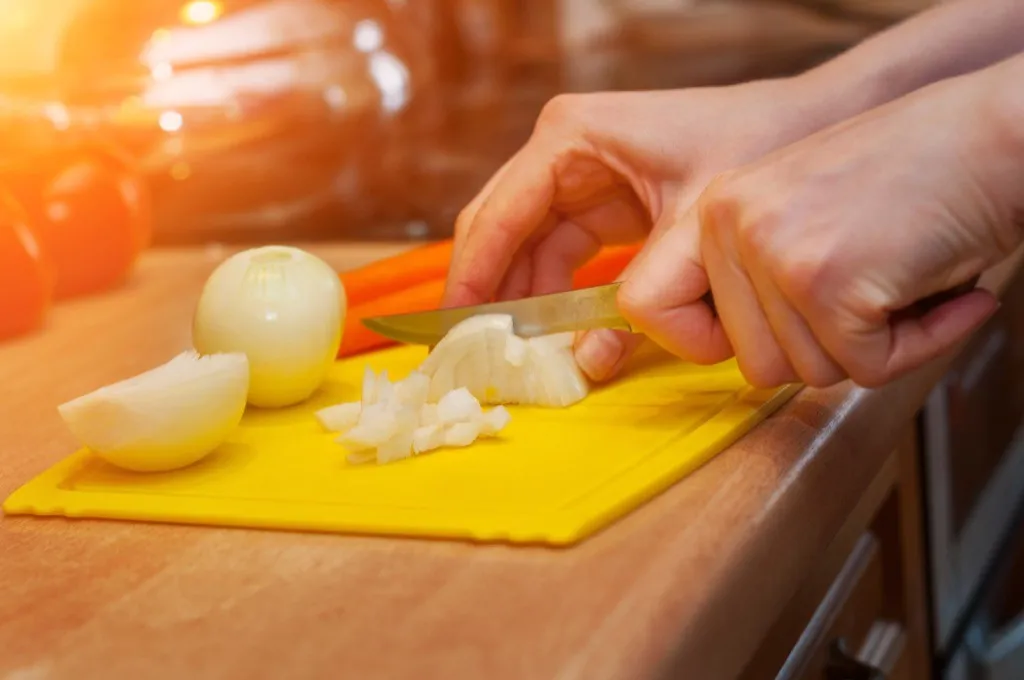
Speaking with CNN, Gerba said, “Recent surveys of homes found more fecal bacteria on a cutting board in the average home than a toilet seat. It’s actually safer to make your sandwich on a toilet seat than a cutting board.”
Best Life was not able to corroborate Gerba’s statement, but it is true that cutting boards can harbor a lot of bacteria in the grooves made by knives, especially if you cut raw meat. The NSF study found that 18 percent of household cutting boards contained coliform bacteria.
The USDA, recommends using one cutting board for raw produce and vegetables and a separate one for raw meat, poultry, and seafood.
RELATED: 6 Alarming Reasons You Should Stop Cleaning With Bleach, Experts Say.
5
Shower and bathtub drains
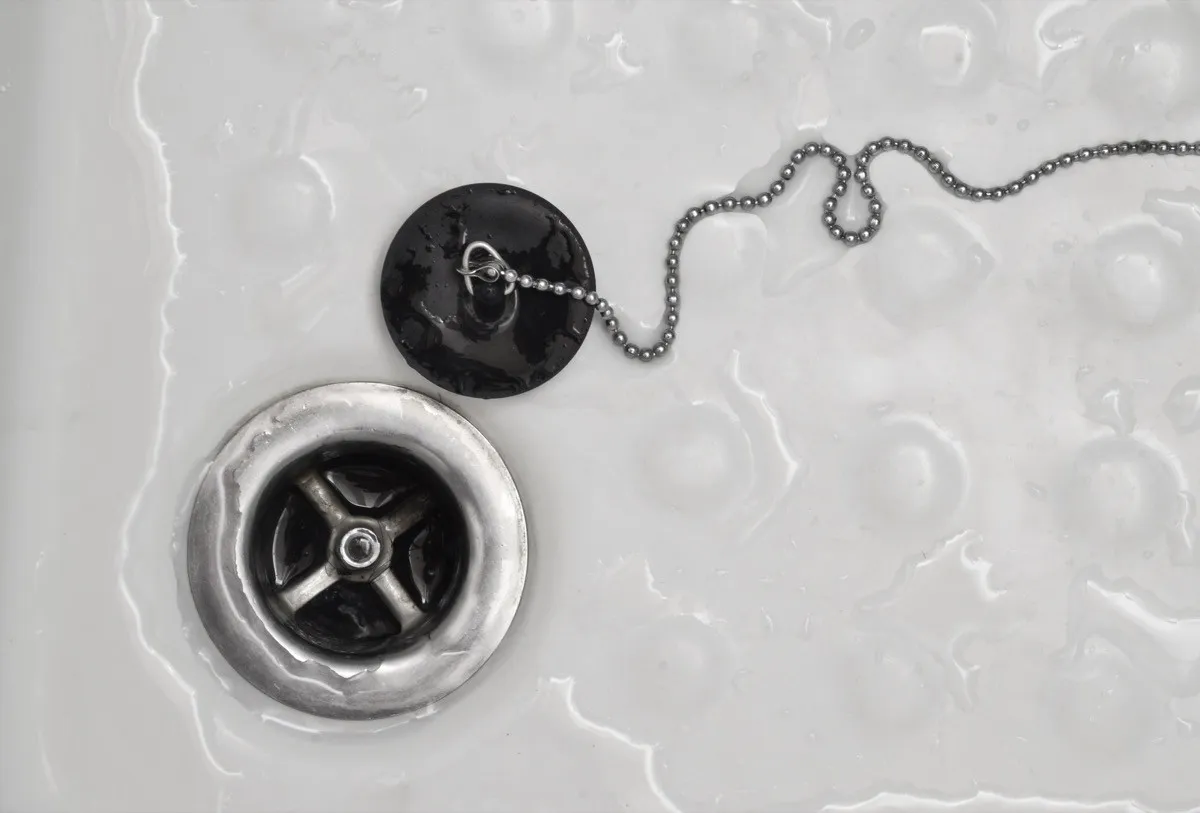
All of this kitchen talk isn’t to say that your bathroom isn’t germy. A separate NSF study tested the homes of college-aged students and found that shower and tub drains were the germiest spots, full of coliforms and E. coli.
Like the kitchen sink, this is a breeding ground for bacteria because of the moisture. NSF advises disinfecting with a bathroom cleaner at least once a week.
6
Bath towels
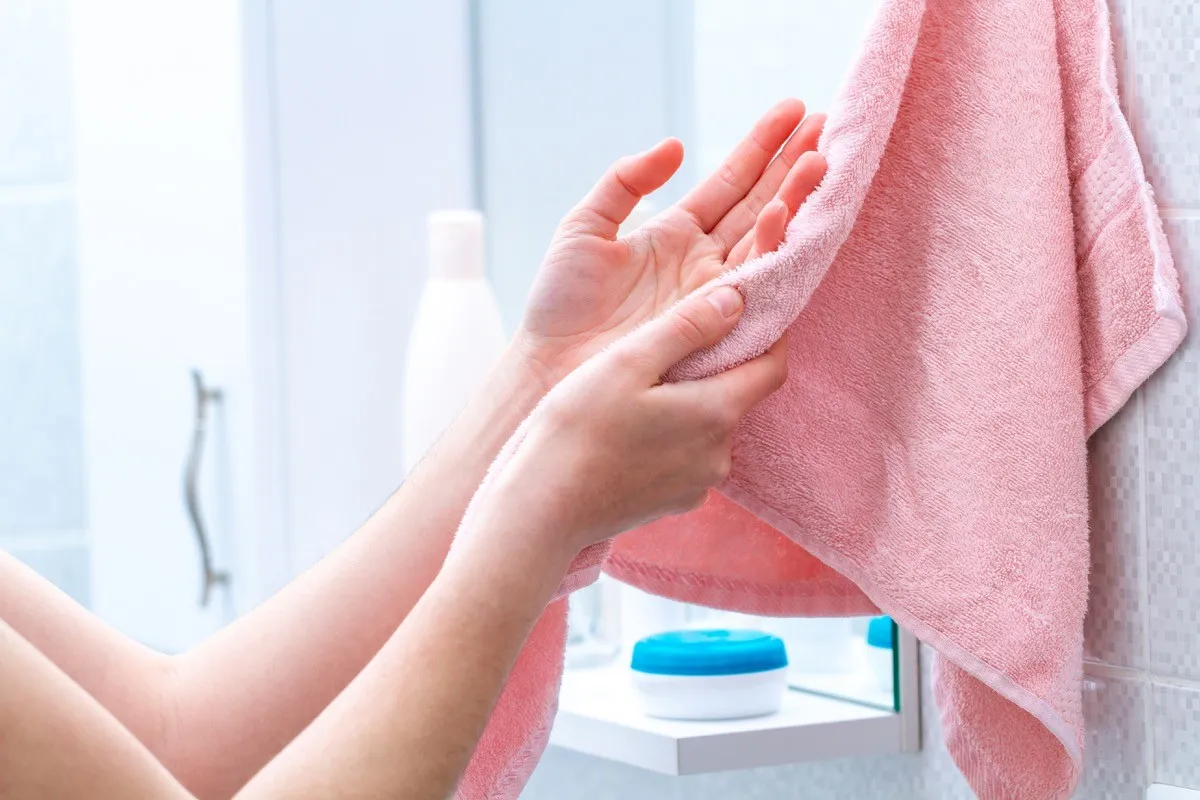
Bath towels are another victim of stagnant moisture.
“E. coli grows quite well on towels. Within about three or four days, you’ll get fecal bacteria in the towel easily because it’s wet, it’s moist,” Gerba told CNN.
“And it’s hard to get rid of the bacteria when you do your laundry with a cold-water wash. Towels are so thick it’s hard to get them really clean,” he continued. “You’ll get more E. coli in your face when you dry your face with a towel at home than if you stuck your head in a toilet and flushed. You’ve got to use hot water wash and dry towels really well.”
To make his point, Gerba told Time that his own research indicated that 90 percent of bathroom towels were contaminated with coliform bacteria and 14 percent carried E. coli.
As Best Life previously reported, most experts recommend washing your bath towels once every two to three uses and using a high-heat setting.
RELATED: How Often Do You Wash Your Sheets? Doctors Say They’re a “Petri Dish” of Bacteria.
7
Dish towels
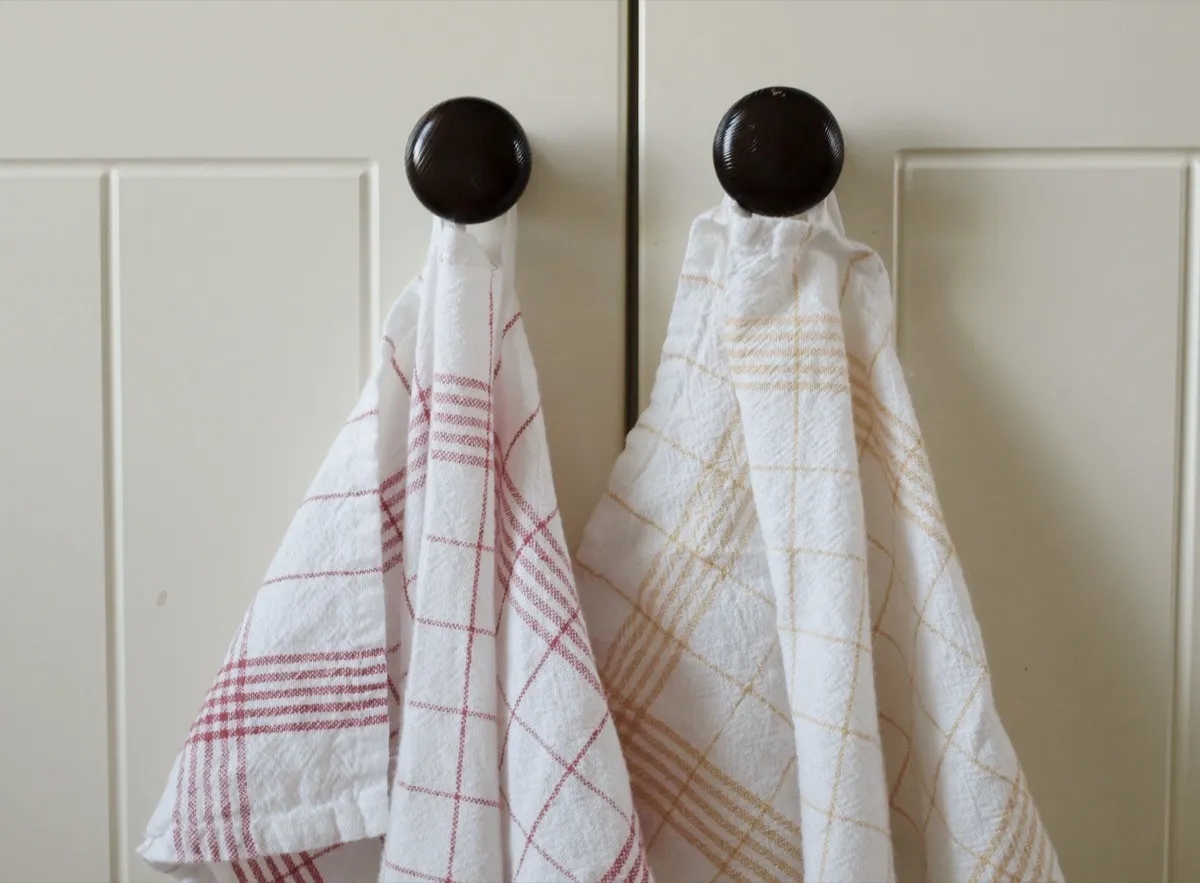
Likewise, your dish towels are probably crawling with even more germs.
A 2014 study published in Food Protection Trends analyzed germs on 82 dishcloths from households across the U.S. and Canada. They found that coliform bacteria was present in nearly nine out of 10 kitchen hand towels, and one in four towels contained E. coli.
In a 2018 study from the University of Mauritius presented at the American Society for Microbiology meeting, researchers found even more bacteria present on dish towels. There was more bacteria on towels that were used for multiple things, like drying hands and wiping down counters.
“I recommend changing kitchen towels daily,” home cleaning expert Becky Rapinchuk, founder of Clean Mama, told Eat This, Not That! “This habit is essential for keeping food-borne pathogens and other bacteria away. My routine is to put out new dish and hand towels after dinner is cleaned up and after the counters are wiped down.”
The USDA’s Food Safety and Inspection Service (FSIS) suggests washing your kitchen towels on hot heat in your washing machine and making sure they’re completely dry on a high setting in your dryer. Rapinchuk also says to “let towels dry before putting them in a wash basket, and wash them separately from anything else.”
8
Couch
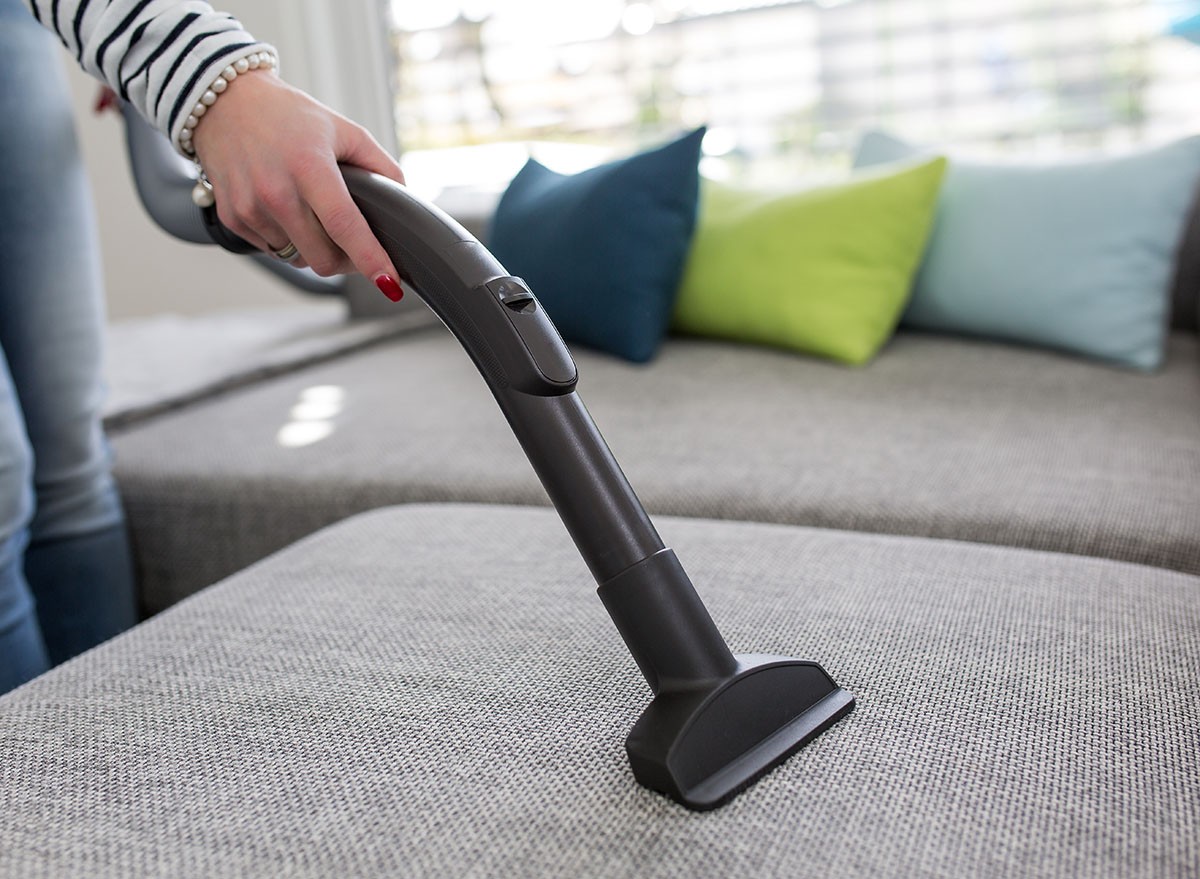
Bet you didn’t see this one coming!
A 2013 study, conducted by UNICEF and the cleaning brand Domestos, discovered that the average family sofa had 12 times the amount of bacteria than a typical toilet seat does.
“Depending on how we use the couch; it can take a lot of abuse,” James Conner, vice president of operations at Molly Maid, a Neighborly cleaning company, tells Best Life. “From eating dinner in the family room or watching a movie with Fido snuggled up against you, the couch can capture more body oils, cooking odors, and airborne dust and dirt than you care to imagine.”
“Often, people only clean up their couches because they can recognize noticeable stains,” explains Greg Goldstein, president of Daimer Industries, a cleaning equipment company. “The dust, dirt, and bacteria can easily go unnoticed and people tend to forego the idea of cleaning the entire couch.”
One of the biggest problems is that most people don’t know how to clean their couch.
“Vacuuming your couch can remove crumbs, hair, and fur,” notes Goldstein. “However, hiring an upholstery cleaner or using a quality steam cleaner is also recommended. A quality steam cleaner is effective in killing dust mites and bacteria, and helping lift stains.”
He recommends doing this one to two times a year for most households, but if you have pets and kids, you may want to consider sanitizing every three to four months.
RELATED: Doctors Say the Disinfecting Wipes You’re Using Have “Significant” Health Risks.
9
Reusable shopping bags
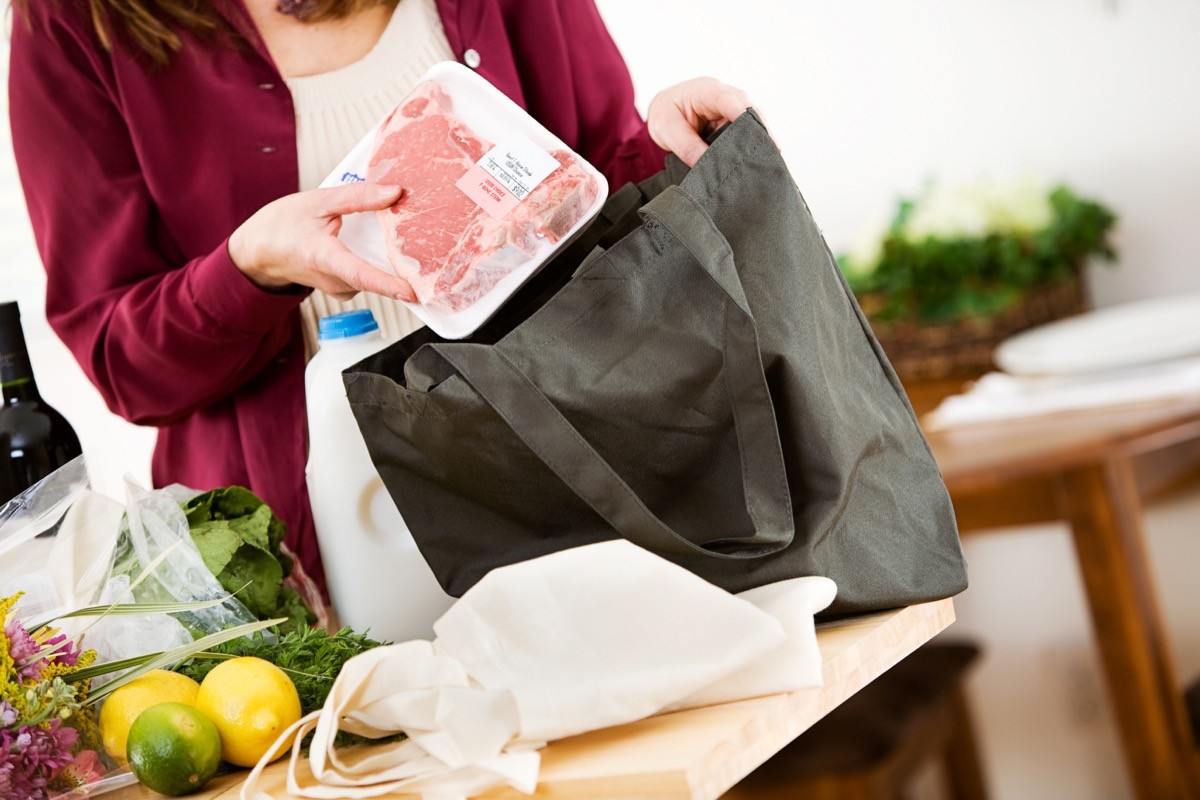
You put them in your grocery art and set them down in the parking lot while you’re loading the trunk—of course, your reusable shopping bags are gross.
A past study found that 99 percent of reusable bags carried bacteria, half carried coliform bacteria, and 8 percent carried E. coli. However, of their participants, only 3 percent said they regularly washed these bags.
“I classify them as pretty dirty things, like the bottom of your shoes,” Ryan Sinclair of the Loma Linda University School of Public Health, a co-author of the study, told USA Today.
But don’t go back to plastic. Instead, be sure you’re washing your reusable bags often, and consider fabric bags that go in the washer and dryer. Sinclair recommends washing them in hot water with a detergent and disinfectant about once a week.
10
Microwave
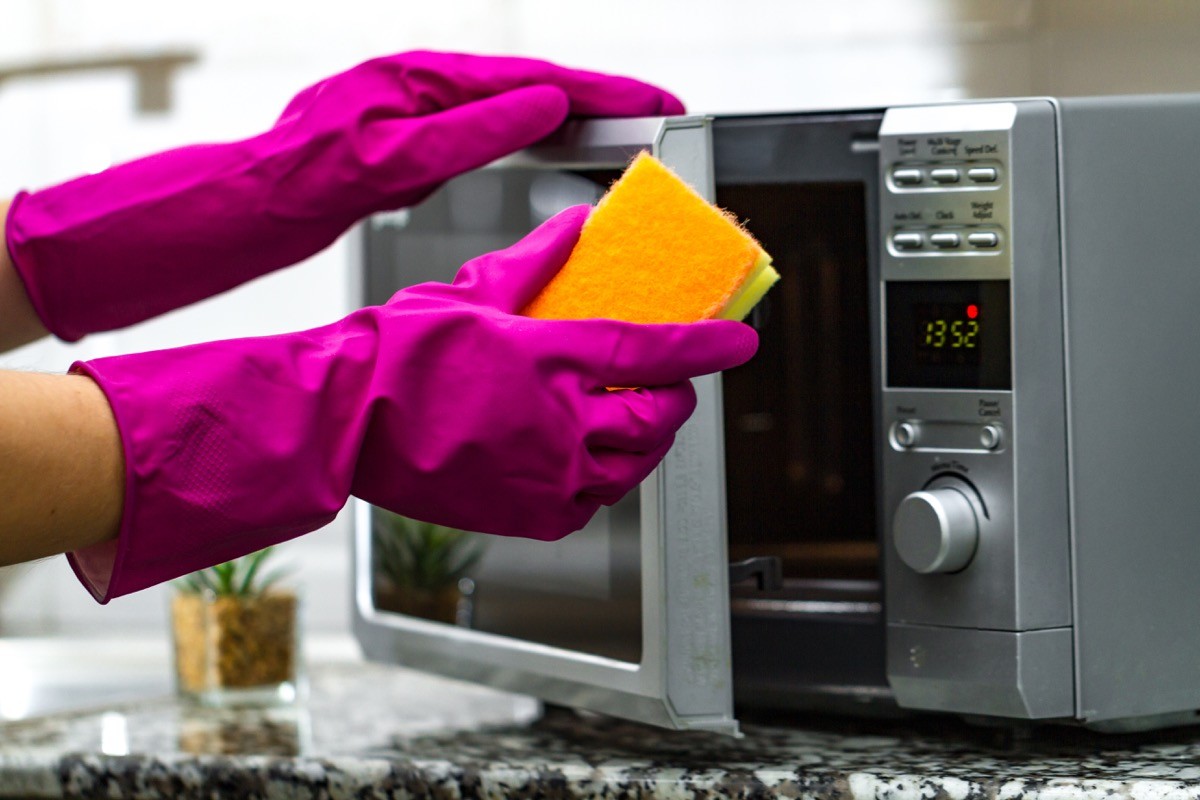
Mark McAuley, a cleaning expert with Ballarat Cleaning Specialists, says there are three main reasons you need to clean your microwave often: steam, splattered food, and cross-contamination.
“By heating up food, microwaves draw out steam. This steam will form condensation and sit on the inner surfaces of the microwave. Water alone left sitting at room temperature will encourage the growth of mold and bacteria,” inculding E. coli, he says.
Over time, the steam combined with the old food left behind can start to permeate new meals being heated.
“As the splattered food reheats again and again, it will give off its own steam, which will then be mixed in with the atmosphere of the turning microwave,” McAuley explains. “This creates an environment of cross contamination since, as that steam settles—some produced by old food, some produced by the new—it will not discriminate.”
Fortunately, your microwave is pretty easy to clean (after unplugging it, of course). Experts recommend steaming a water mixture inside your microwave with either soap, lemon, or vinegar. After letting it cool down, you can use this mixture with a sponge or cloth to wipe down the inside.